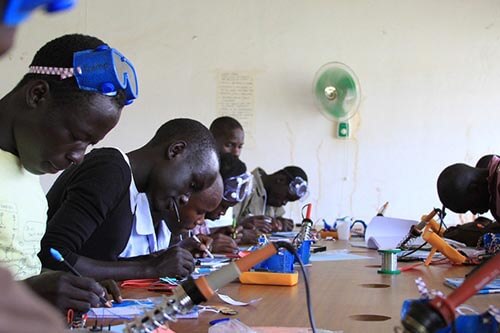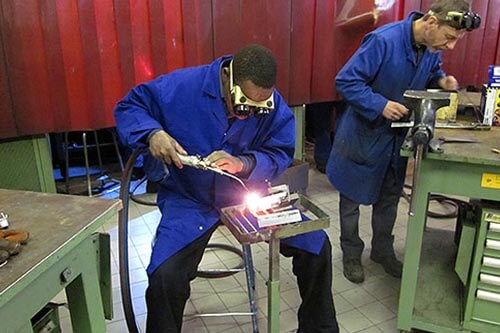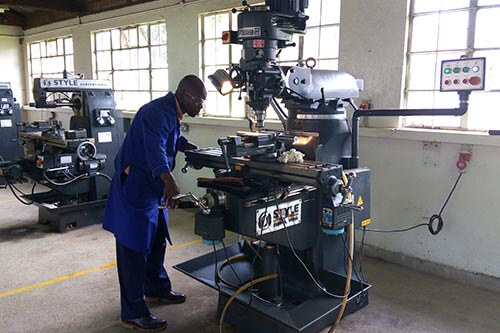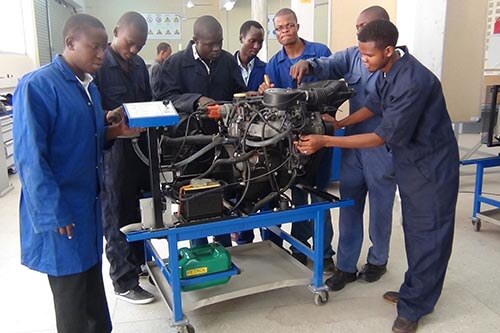Training
Cadena provides training services including training needs assessments, training programme design, management and coordination of tailor-made training programmes for teachers, staff, education managers and government representatives within the area of secondary education, Technical and Vocational Education and Training (TVET) and Agriculture Technical and Vocational Education and Training (ATVET).
Cadena has provided training programmes in 2D/3D design software, 3D printing, automotive, building, construction and carpentry, CNC simulation, electronics, engineering construction, hydraulics, industrial controls, laser cutting, machine tools & CNC, materials and processes, mechanical systems, mechanisms, renewable energy, plumbing and pipefitting, pneumatics, robotics, telecommunications, transportation and welding and sheet metal.








TEACHER AND STAFF DEVELOPMENT
Teacher and staff development is often a problem within outdated schools and schools focused on one particular sector are not drawn together as a holistic system for effective staff development. Often, coordination and effective use of resources are the main issues within staff development, the effects of poor staff development can be broadly discussed. Logically, this has a direct bearing on curricula development and on the open and distance learning initiatives, since coordination is integrally linked with standardisation, quality assurance and impact assessment. Cadena assist in projects in which these problems occur by reviewing, discussing and recreating Staff Development Plans (SDPs).
TECHNICAL VOCATIONAL EDUCATION TRAINING (TVET)
Cadena develops training programmes for Technical Vocational Education and Training (TVET) schools, involving general education, and those aspects of the educational process involving the study of technologies and related sciences and the acquisition of practical skills, attitudes, understanding and knowledge relating to occupation in various sectors of economic life. TVET uses formal, non-formal and informal learning. TVET is recognised to be a crucial vehicle for social equity, inclusion and sustainable development.
In the past, Cadena has provided training programmes for TVET in the following subjects:
- 2D/3D design software
- 3D printing
- Automotive building, construction and carpentry
- CNC simulation
- Electrical / electronics
- Engineering construction
- Hydraulics
- Industrial controls
- Laser cutting
- Machine tools & CNC
- Materials and processes
- Materials and processes
- Mechanical systems
- Mechanisms
- Renewable energy
- Plumbing and pipefitting
- Pneumatics
- Robotics
- Telecommunications
- Transportation
- Welding and sheet metal
A special project completed by Cadena for TVET involved the assistance in the Kenyan Smart Classroom Project, which was designed to improve traditional TVET teaching and learning at 10 Technical Training Institutes (TTIs) through further introduction of student-centred learning, interdisciplinary work, Competence Based Education and Training (CBET), and problem-solving based learning. In the Smart Classroom teachers and students can upgrade their practical skills up to the standards of the latest technology, which will better prepare the students for the labour market. The Smart Classroom consists of a teacher demonstration room and a state-of-the-art ICT lab where, amongst others, design, programming and production skills are further encouraged through:
- Presentations
- Digital lessons
- Investigations
- On-screen simulations
- Virtual experiments
- Practical exercises
- Project and group work
In terms of training deliverables, Cadena delivered a design of training programmes, implementation of train-the-trainer programme for key project staff, implementation of Smart Classroom managers training programme, in-service training for lecturers on pedagogy and the use of the Smart Classroom and new technologies and continuous training support.
AGRICULTURE TECHNICAL VOCATIONAL EDUCATION TRAINING (ATVET)
The provision of agricultural skills development and vocational training in Africa has been largely inadequate across the value chain. Increasing support to Agriculture Colleges should be seen against the backdrop of (rural) poverty and national economic challenges, and the ongoing food security challenges in development countries. Key to rural development, job creation and technological advancement is human development and private sector development, which is often hampered in the rural areas and agriculture sector by the low output (in quantity and quality) of Agriculture Colleges. Cadena offers assistance in development projects focused on agricultural development by providing training at different levels, including, but not limited to:
- Operation and maintenance training to technicians and teachers to ensure (new) equipment is used and properly maintained.
- Teacher training with a focus on improving technical skills as well as pedagogical skills to provided ATVET using Competence Based Education and Training (CBET).
Staff training to ensure the new facilities are well maintained, and education is better organized.
SCIENCE TEACHERS
Science teachers are logically those who teach science which is the study of the natural environment and the nature and behaviour of natural things (and the knowledge that we have obtained about this subject). Cadena created a training programme for science teachers specifically, including:
- Practical hands-on training with science kits, chemicals and consumables
- Preparation of chemicals training
- Health and safety training
- Asset management and control training
- Practical sessions
- Demonstrative science for investigative and practical science lessons and theoretical lessons
PROFESSIONAL CAPACITY DEVELOPMENT
Implicit in the overall capacity building theory is that the ability of (college) instructors and lecturers will be improved so that the standard of training provided ensures college graduates to have both relevant knowledge and the practical skills to assist companies in a number of sectors in improving their productivity. Key concepts in capacity building strategies are:
- Hands-on skills training
- Value chain management
- Market oriented approaches
- Entrepreneurship development
- Labour market linkages
- Best practices in the relevant sector
- Technological inputs